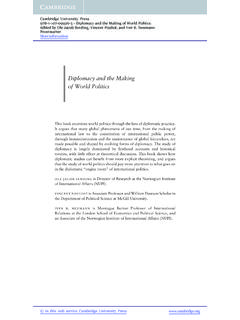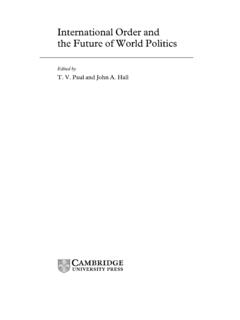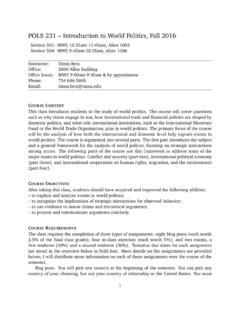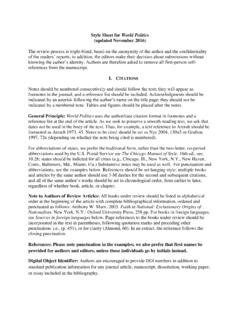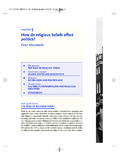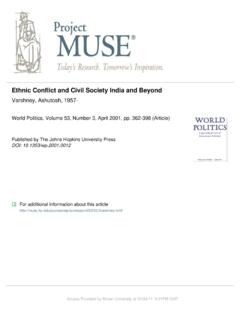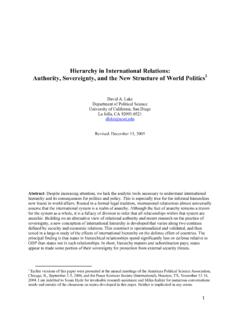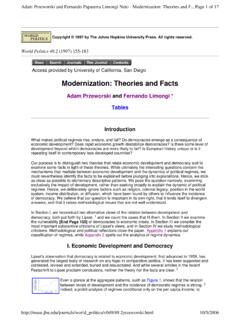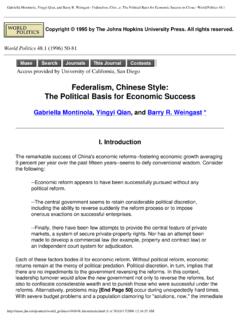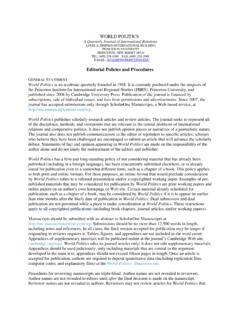Transcription of 86 YHUVXV 7KHP 0DVV $WWLWXGHV WRZDUG 2IIVKRUH …
1 86 YHUVXV 7 KHP 0 DVV $WWLWXGHV WRZDUG 2 IIVKRUH 2 XWVRXUFLQJ(GZDUG ' 0 DQVILHOG 'LDQD & 0XW] world politics , Volume 65, Number 4, October 2013, pp. 571-608 (Article)3 XEOLVKHG E\ &DPEULGJH 8 QLYHUVLW\ 3 UHVVDOI: additional information about this article Access provided by University Of Pennsylvania (23 Jan 2015 20:46 GMT) VERSUS Themmass Attitudes toward Offshore OutsourcingBY edwArd d. mAnSfield and diAnA C. mUTz*The movement of jobs overseas has caused mounting anxiety in the United States over the past decade. Variously referred to as outsourcing, offshoring, or offshore outsourcing, this phe-nomenon first started to arouse concern in the US at the turn of the twenty-first century, when the conclusion of an economic downturn was followed by a tepid recovery in the US labor market. As China, india, and the post-Communist states took steps to increase their en-gagement with the global economy, an extra billion workers joined the global workforce, nearly doubling its size and raising fears that US firms would relocate jobs overseas to cut labor This issue rose to prominence during the 2004 presidential election, when Senator John Kerry accused President George w.)
2 Bush of promoting outsourcing and lambasted Benedict Arnold cEos for moving jobs abroad. Since then, this issue has continued to stimulate widespread public interest. A burgeoning literature on the economics of outsourcing and offshoring has emerged, but few studies have addressed the politics of this we aim to help fill this gap in the literature by providing an understanding of the origins of American attitudes toward begin by addressing differences in terminology among academ-ics, policymakers, and the mass public. in popular discourse and the relatively few studies of mass opinion, the practice of moving jobs overseas has been referred to as outsourcing, meaning when American * earlier versions of this article were presented at the 2011 annual meeting of the American Politi-cal Science Association, Seattle; seminars at Cornell University, the University of rochester, and Texas A&m; and a conference on politics of the Changing world economy, held in Goa, india in 2013.
3 For helpful comments and suggestions, we are grateful to the participants in these conferences and semi-nars, Pulapre Balakrishnan, Christina davis, rumi morishima, layna mosley, and four anonymous reviewers. for financial assistance, we are grateful to the University of Pennsylvania s Christopher h. Browne Center for international politics and the institute for the Study of Citizens and Blinder 2009a; freeman 2009, See, for example, Chase 2008; margolit politics 65, no. 4 (October 2013), 571 608 Copyright 2013 Trustees of Princeton Universitydoi: w oR l d p o l i t i cS 3 See Pew research Center for the People and the Press See rodrik 1997; Amiti and wei 2005; Chase 2008; marschall and Clawson Blinder 2009a, 20 21; feenstra 2010, 5 hire workers in other parts of the world in order to save money. 3 economists are more likely to use the term offshoring to refer to the same phenomenon, and politicians fall somewhere in be-tween in their attempt to communicate with both popular and techni-cal audiences, calling it offshore outsourcing or some other combina-tion of terms.
4 We thus use these terms interchangeably throughout this have argued that outsourcing is another form of inter-national trade. As such, it should have the same sort of distributional consequences as foreign commerce. A growing number of studies have analyzed whether mass attitudes about trade and other aspects of glo-balization fall along the factoral or sectoral lines emphasized by various political economy models. Based on a representative national survey of Americans, however, we find little evidence that either an individual s industry of employment or her occupation explains attitudes toward outsourcing. instead, such attitudes tend to be shaped by ethnocen-trism and antiforeign sentiment. individuals who believe the US should take an isolationist stance on international affairs more generally, who feel a sense of national superiority, or who feel that members of other ethnic and racial groups are less praiseworthy than their own racial or ethnic group, tend to have particularly hostile reactions to outsourc-ing.
5 In addition, opinions about outsourcing are shaped in important ways by how people understand the term and what kind of cues they receive from outside sources such as unions and political parties. Taken together, the results of our study strongly suggest that attitudes are shaped less by the economic consequences of this phenomenon than by what offshoring implies about heightened interaction with and depen-dence on out-groups, foreign firms, and foreign oUtSoURcingThe terms outsourcing and offshoring are frequently used synony-mously in public discourse and sometimes in academic Strictly speaking, however, outsourcing refers to whether or not the production process takes place entirely within a given firm, whereas offshoring re-fers to whether the production process is entirely domestic or includes foreign Outsourcing can be either domestic or foreign; it occurs whenever one firm contracts with another firm for goods or U S V S. t hE m 5736 mankiw and Swagel 2006; feenstra 2010, 5 Bhagwati, Panagariya, and Srinivasan 2004, Bhagwati, Panagariya, and Srinivasan 2004, nonetheless, there are conditions under which outsourcing can undermine a country s welfare.
6 If, for example, outsourcing is accompanied by the transfer of leading technologies from one country to another country where work is being outsourced, then the initial state may suffer the erosion of its monopoly power in products produced using these technologies. See freeman 2009, weisman 2004, included in the production process. foreign outsourcing, in-ternational outsourcing, and offshore outsourcing refer to the move-ment of part of the production process both outside the firm and Offshoring occurs when part of the production process is moved abroad, regardless of whether the relocated process is handled within or outside the , as interest in the effects of international trade on the US labor market grew during the first years of the twenty-first century, Jagdish Bhagwati, Arvind Panagariya, and T. n. Srinivasan point out that outsourcing took on a different meaning. it referred now to a spe-cific segment of the growing international trade in services.
7 7 Although these scholars consider this new meaning to be the proper definition of outsourcing, they also acknowledge that public debate over this phe-nomenon has been muddled as the definition has become ever more elastic. in their words, when many politicians, journalists and even some economists start discussing outsourcing, they soon leap beyond purchases of offshore arm s-length services to include, without ana-lytical clarity, phenomena such as offshore purchases of manufactured components and even direct foreign investment by firms. 8in this study, we use the terms outsourcing and offshoring inter-changeably to describe the decision by a firm to locate part of the pro-duction process abroad and therefore shift some jobs overseas. when asking survey respondents about their opinions and perceptions, how-ever, we use outsourcing since it is the most popular and widely rec-ognized term for this phenomenon in popular political of the public understanding of this term, economists em-phasize that outsourcing is similar to international trade.
8 By and large, they agree that the practice heightens national welfare by promoting a more efficient allocation of resources, thereby raising national income and increasing in congressional testimony and a widely covered press conference surrounding the 2004 Economic Report of the President, n. Gregory mankiw, chair of President George w. Bush s Council of economic Advisers, stated that outsourcing is just a new way of doing international trade. more things are tradable than were tradable in the past and that s a good thing. 10 mankiw s comments 574 w oR l d p o l i t i cS equating outsourcing with trade precipitated a political firestorm, but his views on this topic are widely shared among we turn to a discussion of the three leading models used to explain public attitudes toward trade and that, by extension, might ex-plain attitudes toward outsourcing. it is unclear whether opinions on outsourcing and trade will dovetail. But in light of the dearth of re-search on attitudes toward outsourcing and the similarities that many observers draw between trade and outsourcing, studies of attitudes to-ward trade provide a logical point of departure for our studies argue that attitudes about international trade are driven by its distributional implications.
9 Some individuals gain economically from overseas commerce, whereas others lose. These studies maintain that the former tend to be more supportive of open trade than the in the same vein, outsourcing s distributional consequences may shape mass opinion about this of these distributional consequences often emphasize that the US has an abundance of high-skilled labor and a scarcity of low-skilled labor relative to the rest of the As a result, low-skilled labor is more expensive in the US than abroad and US firms have an incentive to outsource tasks involving such labor to generate cost sav-ings. This action, in turn, drives down the demand for low-skilled US workers, thereby reducing their wages. Conversely, high-skilled la-bor is cheaper in the US than elsewhere, which increases the demand for such workers and bids up their wages. The heightened demand is likely to stem from US firms that need highly skilled workers as well as from foreign firms that insource high-skill jobs to the US to take advantage of the lower labor costs.
10 This simple comparative advantage account suggests that the distributional implications of outsourcing should fall along the lines predicted by a Stolper-Samuelson approach: highly skilled workers in the US should favor outsourcing whereas less-skilled workers should oppose , evidence has been inconclusive as to whether the distri-butional consequences are as theorized. Some economists argue that the distributional impact of outsourcing varies across industries and occupations, implying that workers attitudes toward this phenomenon may be shaped by mechanisms other than comparative advantage. 11 Scheve and Slaughter 2001; O rourke and Sinnott 2002; mayda and rodrik leamer Stolper and Samuelson 1941. U S V S. t hE m 575research on manufacturing industries has furnished considerable sup-port for the comparative advantage approach. robert feenstra and Gordon hansen, for example, found that outsourcing increased the real wages of skilled American manufacturing workers by 1 2 percent during the 1980s, a significant Similarly, J.
